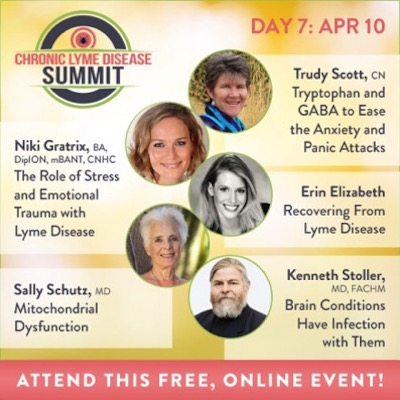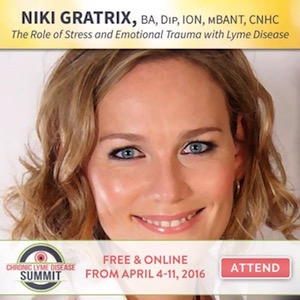Just a quick reminder that today is the last day of new interviews for the Chronic Lyme Disease Summit and tomorrow you get a full day of replays of ALL the interviews.
Here is the line-up for today, day 7:
My interview airs today: Tryptophan and GABA to ease the Anxiety and Panic Attacks
- Many people with chronic Lyme disease have chronic anxiety too and the focus of my interview is how to use targeted individual amino acids GABA and tryptophan to top up low levels of GABA and serotonin while the Lyme is being addressed.
- This gives Lyme sufferers resolution from much of the anxiety (if not all) right away and they don’t need to resort to meds like benzodiazepines or anti-depressants (like the women in the study below). There is also a big connection between Lyme disease and pyroluria and I cover this too.
You can read a bit more about some of the research I discuss here:
https://www.everywomanover29.com/blog/chronic-lyme-disease-summit-anxiety-pyroluria/
Here is a snippet from The Role of Stress & Emotional Trauma with Lyme Disease, a fascinating interview with Niki Gratrix (we’ve met and I love the work she is doing in this area of ACEs):
…stress and emotional trauma have a primary effect on your biology. So emotional trauma in childhood, if you like, your biography becomes your biology. And emotional trauma in childhood, unfortunately time does not heal, it conceals. And the body will remember the trauma. And so to 20, 30 years down the line, you’re going to start to have physical expression of illness due to the unresolved trauma.
So ACEs, which are these adverse childhood experiences, they were first studied in the mid-1990s by the CDC and Kaiser Permanente.
And they looked first at 17,500 adults. And they were looking at the health statistics over a lifetime and correlated them with the number of ACEs that they had. When we talk about ACEs, what do we mean? In the context of that study, they were looking at physical, sexual, and emotional abuse, physical and emotional neglect. They were looking at parents separating or divorce, domestic violence or mental illness in the family, substance abuse, and someone in the family being incarcerated.
So as a child, if you experienced one or more of those ACEs, these were some of the statistics. First of all, 67% of all adults said they’d had at least one ACE. And of 67%, 80% of those had 4 or more ACEs. And essentially, if you have a high level of ACEs, this was correlated with a dramatic increase in the risk of 7 out 10 leading causes of death in the U.S. so if you have four or more ACEs, your relative risk of things like cancer is twice as high, hepatitis 2.5 times as high, depression 4.5 times as high, chronic obstructive pulmonary disease 2.5 times higher, and suicide 12 times more likely to commit suicide with 4 ACEs in childhood. If you have 8 or more ACEs, you have triple the risk of lung cancer and 3.5 times the risk of getting heart disease.
But there’s also a very interesting later study done on 15,500 people by the same researchers, which was the CDC and Kaiser Permanente, just specifically looking at autoimmune disorders. And what they found, again, dramatic statistics. Two or more ACEs, you’re 100% more likely to be diagnosed with rheumatic diseases.
…
How that’s translated in the brain is it’s a chronic fear response that is constantly there. And the brain responds by actually increasing the number of neurons in the brain that react to fear and stress. The amygdala expands. It becomes more activated. That will translate through the hypothalamus, through the HPA axis, the hypothalamic–pituitary–adrenal axis, and that will translate, also impacting the immune system.
…
there’s many experts in the Lyme field who acknowledge that this emotional trauma is a primary impact. And I happen to know Dr. Dietrich Klinghardt’s work very well, very familiar with his work and having interviewed him on my summit, he has his, I think it’s called the “Klinghardt axiom,” which is for each amount of bacterial infection in the body, there will be an equal amount of unresolved toxicity. And for each amount of unresolved toxicity, there will be an equal amount of unresolved emotional trauma. So these things all go hand-in-hand. And they need a multifactorial approach, if that makes sense.
If you are not yet registered you can do so here and catch interviews today and the replays on Monday:
https://qt247.isrefer.com/go/LYME16reg/trudyscottcn
And a reminder if you are considering purchasing the series for later listening and learning, the process will increase when then summit ends. Here is that purchase link:
https://qt247.isrefer.com/go/LYME16order/trudyscottcn/
PS. Tomorrow you get a full day of replays of ALL the interviews so enjoy the rest of the summit!


Hi there. This is very interesting, this particular report on ACEs and the associated research. I am a Kaiser member and had two major traumas (infant rape and another threatening incident that was traumatizing to the point of causing a split) and also major emotional neglect and abuse (alcoholic mother, absentee father). Like you said, my health went totally down at about age 28-30. And still has not recovered despite constant efforts. Do you know if Kaiser has any current program for addressing these traumas and their impact? I could call them but it’s unlikely anyone I talk to would be familiar with the studies.
Thank you.
Karis
I am sorry to hear this. I’m afraid I don’t know but I’ll see if Niki can come and answer your question. She does share many approaches for you to start addressing some of this – including therapy, EFT, yoga, addressing biochemical and nutritional imbalances. She didn’t mention GABA or tryptophan and these amino acids are wonderful for giving some immediate relief while you do all the other work. Here is some info on GABA https://www.everywomanover29.com/blog/gaba-calming-amino-acid-products-results/ There are many articles on the aminos here on the blog and my book goes into the whole nutritional approach in detail.
Hi Karis – I have a long list of resources for healing trauma available by downloading my completely free ebook at http://www.nikigratrix.com – it’s the ebook called 7 Steps to Healing Emotional Trauma and Building Resilience.
I don’t think Kaiser have a program specifically for trauma, they were just involved with the health studies. The best centers for actually working with trauma and recovery are elsewhere and may depend on your illness type. More on this is available in the free eBook. do let me know if you have any other questions
Good luck with your ongoing healing journey Karis.
Warm regards
Niki Gratrix
Niki
Thanks for hopping on here and sharing your wonderful resources
Hello Trudy:I listened to your workshop on anxiety during the Lyme Summit hosted by Dr. Jay Davidson. Great talk and info! I took plenty of notes.
One thing I was wondering… Unfortunately I am on Lorazepam (benzo) and initially I started them on an “as needed basis” back in early 2008 after I started to experience anxiety /panic attacks in Sept of 2007. I was
hesitant to take anything like it but the original prescribing doctor said I needed something or I could end up having a heart attack. So out of concern, I filled the RX. At that time a 30-ct bottle of .5 mg would last
me almost a year. Then the use got more and more. I am up to 1 mg every day because my body is now “needing” them AND for fear of going off (even if “weaning off”) and experiencing seizures and such. I don’t know what
the under lying cause of the anxiety is because I have multiple things going on in this season of life…. Lyme disease, MTHFR, Hypothyroidism and peri-menopause… all of which can cause anxiety. So while I could
wean myself off the Lorazepam, I need to know what (besides dependency) is causing the anxiety. I have some GABA Trex (by Neuroscience) I was taking a while back didn’t have it long but it just didn’t seem to help. I wake up with a nervous gut feeling almost every morning and it’s worse around my cycle. Never wake up rested…just jittery.
I guess what I am really wondering is: Is it okay to take the GABA Trex (or some form of GABA) along with the Lorazepam. And…
2). Should I be taking some zinc with copper (in smaller
amt) to help with anxiety as well? I know you mentioned that HIGH Copper & LOW Zinc could cause anxiety.
Help is much appreciated!
Sherry
It may well be the benzodiazepine that is causing the increased anxiety (more here https://www.everywomanover29.com/blog/benzodiazepine-informed-consent/ and on other blog posts – feel free to search)
I have not used GABA Trex with clients (so can’t comment specifically on this product) and it does only contain 100mg theanine which is a low amount. I find GABA to be more effective – and best taken sublingually. Here are some blog posts
https://www.everywomanover29.com/blog/gaba-calming-amino-acid-products-results/
https://www.everywomanover29.com/blog/how-to-do-an-amino-acid-trial-for-anxiety/
https://www.everywomanover29.com/blog/amino-acids-pyroluria-supplements/
There are typically no issues taking GABA taken with a benzodiazepine, except for people who are super sensitive as a result of the benzo.
If zinc is low, zinc helps with anxiety (it’s one of many possible causes https://www.everywomanover29.com/blog/60-nutritional-biochemical-causes-of-anxiety/). I prefer no copper in supplements.
Thanks so much for answering my questions. One thing I still was wondering about after reading on it, is zinc with copper (in smaller amt). I know you mentioned no copper in supplements. But it was said that zinc w/o copper can prevent the zinc from assimilating properly and actually cause a zinc deficiency. Thoughts?
Please share the link and I’ll comment on it